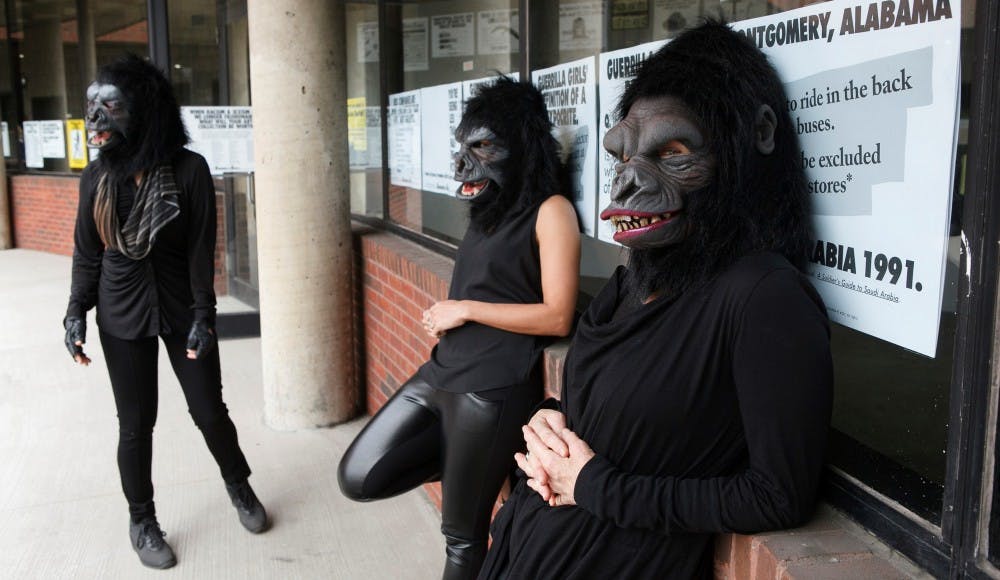The Guerrilla Girls, a feminist activist art group, take the word “guerrilla” in a literal sense by fighting the larger force that is discrimination and underrepresentation of women and people of color in the arts.
In conjunction with the Scottsdale Museum of Contemporary Arts (SMoCA), the Herberger Institute School of Art and ASU Art Museum, ASU will welcome one of the Guerrilla Girls’ founding members to campus in Murdock Hall on Tempe Campus on Nov. 18 at 7 p.m. for a free lecture about politics, engagement and art.
The gorilla mask-clad gang of art world activists was formed in New York City in 1985 with a mission to make equal representation and opportunity for women and people of color in the art world the norm.
Members forgo their own names to adopt aliases of dead female artists, such as Frida Kahlo and Käthe Kollwitz, in order to protect their identities.
"Frida Kahlo" is a founding member of the Guerrilla Girls, and said that although the art world portrays itself as being representative of people from all walks of life, that isn't what is being featured in big museums.
“There’s a stunning glass ceiling for artists who are not white males,” Kahlo said.
Although things have improved since the Guerrilla Girls began their work in the ‘80s, women and people of color still face a lack of equal opportunity and representation in the arts and elsewhere, Kahlo said.
“No one would say now that you can write the history of art without the work of women, people of color, and the LGBTQ community,” Kahlo said. “That’s not to say we should be satisfied by it or that it’s a good situation. It’s an advance, but it’s not a solution.”
Kahlo said women experience “institutional sexism” in both the art world and working world, which is the reason pay discrepancies exist between men and women.
One of the group’s most iconic pieces of artwork is a poster from 1989 that depicts the backside of a naked woman, lounging in a gorilla mask.
The poster reads, “Do women have to be naked to get into the Met. Museum? Less than five percent of the artists in the Modern Art sections are women, but 85 percent of the nudes are female.”
Since the group's inception, the Guerrilla Girls have been challenging the art world’s status quo both nationally and internationally, drawing in large crowds with their gorilla masks and secret identities.
The disguises began as a way to protect group members’ identities as they tried to make a name for themselves outside of the group in the art world. Over 30 years later, the masks have transformed from a mere vehicle of protection to a symbol of unity and anonymity in the art world. The idea is that the Guerrilla Girls could be anyone and everyone.
“They’ve given up their own identity for the cause,” said Muriel Magenta, an ASU art professor and feminist artist. “Not a lot of people would do that.”
Heather Lineberry, the ASU Art Museum senior curator and associate director, said she is enthusiastic about what the Guerrilla Girls stand for and the collaboration between ASU and SMoCA.
“This (equality) is an area of conversation and concern at ASU in the arts,” Lineberry said.
The Guerrilla Girls member will also make an appearance at SMoCA in Scottsdale, Arizona on Nov. 19 at 10 a.m. for an activism and art themed workshop, in conjunction with SMoCA’s current exhibition “Push Comes To Shove: Women and Power." Tickets to the workshop cost $35 and can be purchased on its website.
Sara Cochran, the SMoCA director and chief curator, said the Guerrilla Girls form an important part in the growing discussion about women’s place in society and a national climate is antagonistic towards it.
“I look forward to hearing from a veteran activist who has spent the past two decades using statistics, humor and performance to change perceptions and reality for women artists,” Cochran said. “Here in Arizona, we need to hear her story and learn from her drive. This will be a celebration of how to change the world.”
To reserve a free ticket to the Nov. 18 lecture at ASU, RSVP here.
Reach the reporter at taylor.a.transtrum@gmail.com.
Like The State Press on Facebook and follow @statepress on Twitter.




